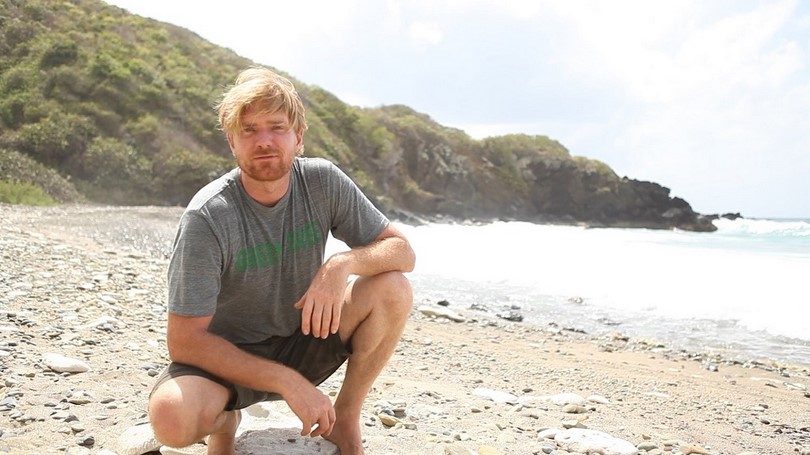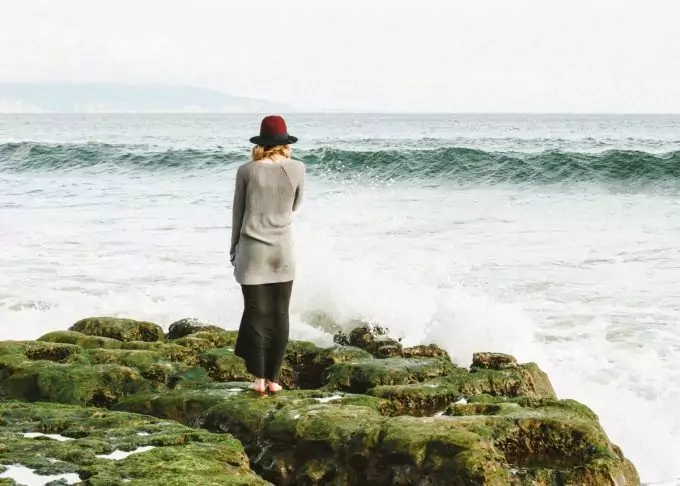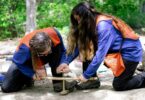Imagine you are Robinson Crusoe and then ask yourself: do you know how to survive on a deserted island? Of course, nowadays the scenario would be different: a plane crash, a storm that hits the ship you’re cruising on, a yacht expedition that goes wrong. But the end result is the same: you get stuck on a tropical island with nothing else but your strength and knowledge to help you survive. You are far away from the romance in “Blue Lagoon” and you have to do something to stay alive until help arrives.
[the_ad_placement id=”in-text-1-type-r”]You may find yourself in different situations: your plane crashed and there are other survivors or you are all alone, with nothing else but your clothes; you may gather stuff to use from your boat or ship or you have absolutely nothing for making it easier to survive.

Better case scenario: more survivors and some supplies
Once the tragedy happened and you find yourself on an island you’ve never wanted to visit, you have to do something in order to survive.
First of all, take a look around you and try to figure out the size of the disaster. Look for other survivors, it will be much better to face the next days together with other people. It could be much more comforting too. Ask the other people you find to help you. Some of them might be hurt. Put them away from immediate danger, like the tide or sharks (if they are still in the water).
After you gather everyone, start putting together all your belongings: lighters, papers, chewing gum, everything you have might be of help. Also gather every left-overs from you plane or ship. You may use wood or metal pieces to assemble a shelter. It would be perfect if you could find some blankets, sheets, pillows or even medical supplies. Do not leave anything behind, you don’t know what use these small things may have.
You may be lucky and find a cell phone. If it still has battery power and reception, try to contact the authorities. Tell them the last exact place you know you were located before the accident. Using wireless they may be able to find your actual location. In this case, you will only need to wait for the rescue team to arrive.
If you don’t have a cell phone (which is most probably), you should make a plan for the next days. Try to stay calm and tell others to do so. This is the only way you can think straight and the only chance you get to develop a good strategy for surviving those tough conditions.
Find out what jobs the other survivors have. A doctor could be very helpful for the hurt people who seek medical care. It is important for them to get first aid so that their wounds would not get infected or even become lethal. Search your supplies: see how many bottles of water, what food and what helpful objects do you have.
Finding water on the island
Never drink water from the sea. Even though you are surrounded by waters, drinking it may cause even death. These are the effects the sea water may have over your body:
- Blood pressure – Drinking salt water can have devastating effects on blood pressure. The sea water leads to a strong increase in blood pressure, which triggers other harmful effects on the body. High blood pressure exerts great pressure on the heart which starts to pound.
- Heart rate – To cope with high blood pressure, which occurs due to consumption of salt water, the heart begins to pulsate increasingly faster. It appears difficulty in breathing, followed by sweating and dehydration (through sweating).
- Physiological changes – After excessive sweating dizziness, headaches and nausea occur followed by vomiting and bloody stools. These painful symptoms of the body hasten the dehydration process, shortening the survival time of the patient. Symptoms appear only if saltwater sea is consumed in excess.
- Excessive thirst – And from here you reach the next stage: excessive thirst. As you become dehydrated, your body feels the need of drinking water. The lips crack and injuries occur. The salt water will not help improve your state nor to hydrate your body. Due to excessive salt content of sea water, the body doesn’t assimilate water, but salt. As such, there is no sense of saturation but a continuing need to drink more water.
- Brain damage – The infiltration of the huge amount of salt in the body affects the entire immune system, reaching to slow down brain activity. Imbalance and delirium occur and beneficial fluids begin to decrease in alert mode.
- Loss of consciousness – As a result of the consumption of salt water and physiological changes that occur after you may even lose consciousness. It is the result of lack of drinking fresh water and the existence of an excessive amount of salt that walks through your whole body. This thing that causes damage, sometimes irreparable, on brain function.
- Inability of making decisions – The ability to make decisions will be strongly affected by the salt from the body. The scientific explanation is that the intake of salt water from the sea will never satiate you. Thirst increases with each sip and you continue to drink until the amount of salt reaches the brain. From there, delirium appears.
- Kidney failure – Renal failure occurs when sea water is drunk in large quantities and over a long period of time. Kidneys are not designed to withstand such an amount of salt, so inevitably failure occurs and then the kidneys are blocked.
- Death – If you do not receive professional help in time drinking a lot of saltwater may cause death. Dehydration, loss of consciousness, followed by renal failure can cause lethal.
So, find fresh water sources. Elect some people who can search the island for food and water. However, water is the first priority you have. You may survive up to 20 days with no food, but the lack of water will kill you after 72 hours.
Check out this earlier piece: Water Survival: How to Collect Water and Make Salt Water Safe to Drink
Continue the survival preparation
Start building a shelter with whatever materials you have around. It should be strong enough to resist rain or winds you may encounter. You may sleep on blankets, leaves or towels, depending on what you have available. Try to dry your clothes if they are wet and keep them like this if possible.

Image credit: grizly.com
When the shelter is ready start searching for food. Depending on the island you may find bananas, coconuts and other fruits. If you want to, you may cook them using a coconut as your pot. This is the way your meals will look like for a while. Another great source of food could be fishing. You may fashion a rod out of bamboo sticks.
Be careful at sharks while fishing. Do not leave shallow waters, it is less likely the predators come there.
[the_ad_placement id=”in-text-2-type-r”]You should also stay alert so you don’t get attacked by other animals. You really don’t know what kind of fauna is there on your island. The first nights stay awake in shifts and watch for predators that might be tracking you.
Start signaling for help. The best way to do that is to light a huge fire that can be seen from a great distance. Use twigs, small or large pieces of wood, anything that can burn is good, and place tinder in the middle. If you don’t have lighters or matches try to ignite the fire using glasses or some other lenses to concentrate the sun rays on the tinder.
There is the possibility that lenses are not available either. Then you should use the “Fire-Plow” method:
During the day, add some wet wood and leaves to the fire. The thick smoke will be noticed by any plane or ship that passes nearby. You may also write SOS on the sand with the help of some large branches. The letters must be large so they can be seen from the air.
After you do all these wait for the help to come. The waiting time may be more pleasant if you can fill it with nice activities such as mind or sport games.
Worst case scenario: all alone and no supplies
The most important thing for you is to remain calm and analyze the situation. The Scouts device “STOP” is perfect for you right now: Stop, Think, Observe and Plan. You will have better chances to survive if you do not panic.
It’s too late now to be sorry that you have not taken a first aid course, or that you have not brought the medical kit with you. No doctor or ambulance is coming, there is no hospital nearby. You have to do something. Try to do your best with what you have at hand. There is no point in quitting, surrendering or dying. If you have a strong will, you can escape alive.

In a survival situation you will have to use all your body and mind capacities. You have to face many stresses: fear, pain, sickness, wounds, cold and/or heat, thirst, hunger, fatigue, lack of sleep, boredom, loneliness, isolation. You will have to be able to resist all of those.
In a crisis situation the first step in the struggle for survival is to properly prioritize and decide what the first emergency intervention should be. Always highlight the problems and order them hierarchically. You cannot solve them all at once.
For survival some conditions or basic necessities are necessary: air, water, food, fire, shelter. The proper functioning of the human body can stop (and death occurs) and this may be caused by the deterioration of health (wounds, shock, hemorrhage, respiratory arrest, crushing, serious illness, etc), lack of water, food, cold or excessive heat .
First, examine yourself for any possible wounds. The most urgent thing to do is to perform the first medical aid: stop the bleeding, stabilize the acute problems, so that you can take care of the whole situation. Do check out our basic tips on how to survive in the wilderness to give you more insight.
The next thing to do is to find water. There are many sources of fresh water:
- Rain – collect it using any recipient you may have, such as coconuts, large leaves, tree hollows or gutters from rocks. If it looks like it is going to rain, dig a hole in the ground and line it with a canvas sheet or plastic if it happens to have something at hand. Or with oiled paper, leaves, etc. Their use can prevent any water leakage into the soil that is as thirsty as you are.
- Waterfalls, springs – you may find them inside the island
- Dew – you may collect it from the leaves
- Solar still – if you have a piece of approx. 80 x 80 cm sheet of plastic, you can try to “milk the” soil. The method does not always work, but sometimes it can even produce more than 0.5 l/day.
- Dig a hole with the top diameter of approx. 1 m. It should be deep enough to fit a bucket in it. Stretch the plastic over the hole and fix its edges with soil or rocks. In the center of the foil put a stone that will give a cone upside down. The bucket or the collector jar will have the mouth about 5 cm below the top of the cone.
- The sun will heat the walls underneath the plastic – which will force the water evaporation from the ground. When the air beneath plastic becomes saturated with water vapors water drops will appear on the surface of the film due to condense because the foil is cooler than the air below it. The drops will fall into the vessel. The solar still is also running at night, because the soil is hot and the foil is cold. All you need is patience.
- Rub the bottom of the foil with sand and the water droplets formed on it will flow more easily, but be careful that the film surface remains clean. If you have a hose, a pipe or a stick you can place it in a bucket end. You can suck the water through the pipe, without removing the plastic.
Do check out our tips on how to effectively store water to increase your chances of survival.
Build a “Lean-To” shelter
or a “Tepee” shelter:
The next step is to start a fire so you can be found and look for food or go fishing.
Getting rescued – you have 2 options:
- wait for the help to come to you
- leave the island in search for help
There are some facts you have to take into consideration: all planes are strictly monitored, so if something happens to them the authorities immediately start the search for rescue. Ships in difficulty are searched only if they have launched the SOS signal.
[the_ad_placement id=”in-text-3-type-r”]The decision to leave from the accident scene instead of sit and wait for help is critically vital. You must analyze together all the factors you base your decision on. Your choice must be made with good judgment because the two alternatives have both advantages and disadvantages. For example, if you sit and wait you save your power and energy. Instead, on the road you will need a lot of will and daring to continue.

Image credit: ruspow.com
If you are forced or choose to leave the deserted island you might get in trouble. You may consider the island as a place where you can get food and water and you are potentially safe. Before you decide to leave consider the following questions:
- Are you healthy enough to go through the whole journey? You don’t know how long it may take to get to someone who can help you.
- Are you completely sure that there is no chance left for some plane or ship to find you?
- Is there a real chance that you’ll get spotted on the sea? Because the only way you can leave the island is by raft.
If your answer to all these questions is “yes”, then you should start planning your trip.
Build a raft – The best shape for the raft is the rectangular one. The raft for one person should have about 3 to 3.50 m wide and 1.50 m long and it should be made of logs or trunks approximately 15 cm thick.
This is how you can do it:
Take all the supplies you think you will need: fresh water (as many containers as you can carry), food, clothes, something to protect you from the sun rays. You really don’t know how many days you will spend on the water.
You never know where life will take you. This minute you are sitting comfortably on the plane, watching your favorite movie and the next minute you may be on the seashore, with nobody beside you, no food and no water. This may be the key moment when your decisions will determine if you will survive or not. Everything is up to you. You will survive with calm, little knowledge and good judgment.
For ways on how to purify water in emergency situations, don’t forget to read our article on this topic.






What you can do with sea water is to trap it’s condensation in a container and drink that instead. To do this, you would need two clean containers (as clean as possible), a plastic bag or aluminum foil and some sea water. Place the sea water in one container and drape the foil or plastic over it but make sure that it does not cover the container completely, it should not act like a lid. Extend one end of the plastic or foil over the other container and raise the other end. Place it under the sun and wait for the condensation to drip into the second container. This will be water at its purest, completely salt free.
Thank you for sharing this method with us, Kevin
Abundant food in islands are definitely fish and coconuts (which will also keep you hydrated!). Spearfishing would be the fastest (I’ve never heard of anyone fishing in a deserted island with a rod) and opening coconuts can be very challenging and you might waste the first few. You never know how long rescue is gonna arrive so prioritize water but definitely search for food.
Only problem with eating to many coconuts is that they give you the shits, so don’t eat to many of them. Another good source of food, if you can find them is crabs.
That’s the spirit, Sandra. You need to prioritize on water as you forage for edible food.
Yeah, eating too much raw coconut meat may not be so great. You can resort to other food sources apart from coconut and fish, such as crabs.
Yup, to many coconuts will give you the runs, Ray Mears said so :). You can cook crabs and eat fish raw.
You do not have to eat too much raw coconut meat. There will always be other sources of food, such as fish, crabs, seaweed, and clams.
Survival on a deserted island could be very challenging and frustrating if you are there alone. You need courage to stay there and send ‘SOS’ signal. However, if you made it with other persons, then it becomes easier for you to cope as you can get help and attention from them. The steps you can take to survive the situation are stop, think, observe, and plan. What other steps do you think you can take to survive on a deserted island if you find yourself there alone?
If you get stuck in a deserted island, the very basic skills that you will need among other things are your survival skills. This includes anything from building shelter, finding food & water, creating survival weapons, and building a fire to mention a few.